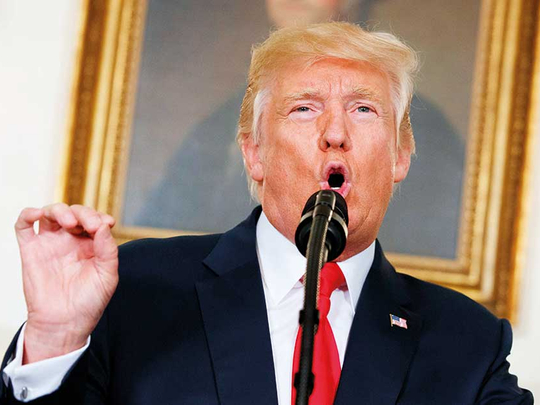
Washington: Jared Kushner’s trip to the Middle East this week will be a do-or-die moment in the Trump administration’s nascent Middle East peace process initiative, according to the Palestinian Liberation Organisation’s representative in Washington. Unless President Donald Trump’s team finally comes out with some public explanation of its vision, he said, the effort could be over before it really gets started.
Husam Zomlot, who took over as the head of the PLO Washington office this spring, hosted a roundtable with reporters Thursday morning to preview next week’s meetings between Palestinian President Mahmoud Abbas and Kushner, Trump’s special envoy for Middle East peace Jason Greenblatt and deputy national security adviser Dina Powell.
The high-level White House delegation will visit Abbas in Ramallah on Aug. 24 at the end of a regional tour that will also take them to Israel, Egypt, Saudi Arabia, Qatar, the United Arab Emirates and Jordan.
“It’s now or never,” Zomlot said. “This is the time and this is the opportunity . . . we are hanging on this opportunity . . . we want it to succeed.”
Ahead of the meetings, the PLO is laying out a public position for what it wants: specifically, that the Trump administration clearly and unequivocally endorse the two-state solution. Trump was agnostic on the issue in February and said he would favor a one or two state solution: “I like the one that both parties like.”
Greenblatt has been going back and forth to the region for months in a listening mode, but now is the time for the Trump administration to start talking openly about the final destination for the talks, Zomlot said. He communicated that directly to Greenblatt in a meeting at the White House earlier this week.
“Now we need to hear something about where we are going,” he said. “It’s about time we hear it . . . We really expect clarity.”
The Trump administration hasn’t presented any detailed American vision for the peace process and its direction up to now, said Zomlot. If that continues, he warned, the window for making Trump’s “ultimate deal” could close.
The Palestinian leadership has to be able to argue to its people that they should invest their trust and confidence in the Trump administration. If next week’s meetings aren’t “credible,” the Palestinian leadership will tell its people they are “going full monty” in pursuing resolution of the grievances at the United Nations and through other means, Zomlot said.
“We are terrified by the prospects of the alternatives and what could replace already a bad situation,” he said.
“We don’t have a choice. The only choice is to keep pushing in this direction.”
The White House is keeping expectations low ahead of Kushner’s trip.r.
“President Trump has previously noted that achieving an enduring Israeli-Palestinian peace agreement will be difficult, but he remains optimistic that peace is possible,” the official said.
“To enhance the chances for peace, all parties need to engage in creating an environment conducive to peace-making while affording the negotiators and facilitators the time and space they need to reach a deal.”
All sides admit that environment is not yet established. Former US ambassador to Israel Daniel Shapiro argued in Foreign Policy this week that all of the three leaders—Trump, Abbas and Israeli Prime Minister Benjamin Netanyahu—are engulfed in political situations that constrain their ability to pursue the ambitious policies needed to make peace.
Also, the US congress is moving forward with a bill to restrict US aid to the Palestinian Authority commensurate with the PLO’s funding for families of accused terrorists. But that funding programme is “nonnegotiable,” said Zomlot. “We are not going to get past it.”












